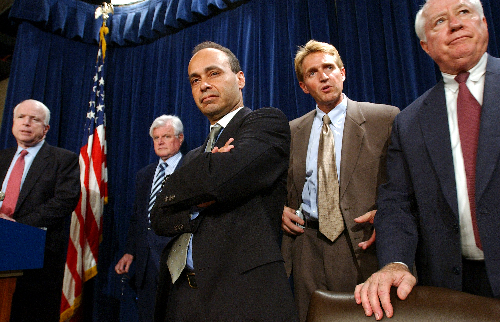New Report Looks at Growth of Nativism in Congress
 A new report from Building Democracy Initiative examines the growing role of nativism in national politics. Chronicling the rise of the House Immigration Reform Caucus, the BDI report, Nativism in the House: A Report on the House Immigration Reform Caucus examines not only the growing influence of nativist and xenophobic philosophies in national politics, but the concerted effort of the far-right to bring their extreme ideological agenda to the forefront .
A new report from Building Democracy Initiative examines the growing role of nativism in national politics. Chronicling the rise of the House Immigration Reform Caucus, the BDI report, Nativism in the House: A Report on the House Immigration Reform Caucus examines not only the growing influence of nativist and xenophobic philosophies in national politics, but the concerted effort of the far-right to bring their extreme ideological agenda to the forefront .
The "report tells us much regarding the shape that "immigration politics" and public policy is likely to take in the foreseeable future. The Caucus's extreme ideological agenda, long-standing ties to anti-immigrant groups, and cohesion in a fractured House of Representatives makes it a noxious ingredient in the melting pot of America. It has drawn even well-intentioned immigration reform proposals down into an abyss of nativism and xenophobia." Nativism in the House: A Report on the House Immigration Reform Caucus
In the ebb and flow of nativist politics, the House Immigration Reform Caucus has been one of the most powerful and significant forces on Capitol Hill. With 110 congressmen and women as of this report, its members constitute fully one quarter of the House of Representatives. Members have introduced some of the most punitive legislation proposed during the last two House sessions. Their past chairman, Rep. Tom Tancredo (R-Colo.), is now running for president and participating in national debates. Their current chairman, Rep. Brian Bilbray (R-Calif.), is a former lobbyist for the Federation for American Immigration Reform (FAIR). Some of its members have helped legitimize vigilante organizations such as the Minutemen. While voters tend to view their representatives as individuals or by party affiliation, the members of the House Caucus have acted as a bloc. Collectively, they have stood athwart the legislative process, preventing the emergence of meaningful and humane policy choices. And they have gone all the while virtually unnoticed.
In this report, the Center for New Community's Building Democracy Initiative examines the House Immigration Reform Caucus.
The Anti-Immigrant Movement Sets the Stage
From the emergence of a new nativist movement in the late 1970s, groups such as the Federation for American Immigration Reform (FAIR) have sought influence inside Washington D.C….
…Today, a dozen anti-immigrant organizations maintain national profiles. These groups have combined annual budgets of over twelve million dollars, and an active donor base of between six hundred thousand and seven hundred fifty thousand. As these national groups have expanded their influence, the number of state and local organizations has jumped up. Between January of 2005 and January of 2007, such groups have increased in number by 600 percent.
Formation of the Congressional Immigration Reform Caucus and Rep. Tom Tancredo
…Tom Tancredo founded the Congressional Immigration Reform Caucus (hereinafter the Caucus or HIRC) in May 1999, soon after he began his first term as a Republican congressman from Colorado's Sixth District. During its first years, the Caucus had few members and served largely as a platform for Tancredo's views on immigration….
On August 1, 2001—five weeks before the events of 9-11—Tancredo introduced H.R. 2712, a bill intended to begin a moratorium on legal immigration, according to the Library of Congress' THOMAS website. Much of the recent public discussion on immigration policy has been voiced about "illegal" immigration. The particulars of this bill, however, demonstrate that opposition to legal entry remains an integral part of so-called immigration reform. This initial proposal would have cut the number of visas issued for family-sponsored immigrants to zero. And it would have cut the visas for "priority workers" to zero. The bill was referred to committee, however, and went nowhere. Undeterred, Tancredo introduced H.R. 3222 on November 1, 2001 with the intention of sharply reducing the number of H1-B visas issued to high-tech professionals. That bill also was referred and died in a subcommittee.
It is useful to remember that questions related to immigration have always been intertwined with questions of national identity. As Rep. Tancredo told one interviewer, "…if we don't control immigration, legal and illegal, we will eventually reach the point where it won't be what kind of a nation we are, balkanized or united, we will have to face the fact that we are no longer a nation at all…" His is a sentiment which has been oft repeated by members of the HIRC….
The year 2005 was a watershed year for the anti-immigrant movement. In April, the Minuteman organization was launched with an armed civilian "border watch" in Arizona. Although President Bush described the Minutemen as "vigilantes," the HIRC defended and praised the group in a "Field Report" entitled "Results and Implications of the Minuteman Project." In a separate statement, Caucus member Phil Gingrey (R-Ga.) said, "The Minuteman Project is a shining example of how community initiative and involvement can help make America a safer, better place to live." The sentiment was echoed by the eight other congressmen cited in the press release.
Also in 2005, Tancredo personally introduced a resolution proposing that the Constitution be amended to establish English as the "official language," another resolution "recognizing the importance of Western civilization," legislation to enhance border enforcement and curtail H1-B visas, as well as several amendments aimed at changing federal enforcement policies. He introduced eleven different measures in all, none of which succeeded. But Tancredo had raised the flag of the anti-immigrant movement within Congress. By August, the Caucus registry had grown to 82 members of the House.
By December of that year, the House passed H.R. 4437, known popularly as the "Sensenbrenner Bill." James Sensenbrenner, a Republican from Wisconsin's 5th District, was first elected to congress in 1978, and was chairman of the House Judiciary Committee at the time. He was not then, and is not now, a member of Tancredo's Immigration Reform Caucus. Nevertheless, H.R. 4437 was widely regarded by both immigrant rights activists and moderates as an unnecessarily harsh bill that was unlikely to pass in the Senate. It would have turned undocumented immigrants into felons (current law considers this violation a misdemeanor) and thus make them ineligible for citizenship in the future. It would have also criminalized anyone who gave them assistance of any kind, including providing them with simple social welfare or routine medical services. The bill also called for the construction of 700 miles of fencing on the southern border.
The debate in Congress became so vicious that even conservatives were forced to comment on its racism. "Some anti-immigrant Republicans are guilty of demagoguery and racism," one Republican governor, Mike Huckabee from Arkansas, told the press.
Read the complete report; Nativism in the House: A Report on the House Immigration Reform Caucus















 Yesterday, Reps. Luis V. Gutierrez (D-IL) and Jeff Flake (R-AZ.) introduced the House version of long awaited immigration reform legislation. The "Security Through Regularized Immigration and a Vibrant Economy (STRIVE) Act" contains most of the provisions of the bill that came out of the Senate Judiciary Committee last year with additional "triggers" added that would insure that the border security aspects of the bill were working before any legalization of the current undocumented population could begin. Additionally, a "touchback" provision was added requiring some undocumented immigrants to leave the country and re-enter before normalizing their status.
Yesterday, Reps. Luis V. Gutierrez (D-IL) and Jeff Flake (R-AZ.) introduced the House version of long awaited immigration reform legislation. The "Security Through Regularized Immigration and a Vibrant Economy (STRIVE) Act" contains most of the provisions of the bill that came out of the Senate Judiciary Committee last year with additional "triggers" added that would insure that the border security aspects of the bill were working before any legalization of the current undocumented population could begin. Additionally, a "touchback" provision was added requiring some undocumented immigrants to leave the country and re-enter before normalizing their status. He was awfully thin-skinned when he talked – repeatedly – about “the name-calling . . . by a lot of the pro-immigrant advocates,” including officials of the Mexican government and protesters in Mexico City who, according to Sensenbrenner, have carried signs depicting him as a Nazi.
He was awfully thin-skinned when he talked – repeatedly – about “the name-calling . . . by a lot of the pro-immigrant advocates,” including officials of the Mexican government and protesters in Mexico City who, according to Sensenbrenner, have carried signs depicting him as a Nazi.  As the road show moves further from the border the topics appear to become even more political. Along the border topics have ranged from, “What are the criminal consequences of illegal immigration along the Southern Border?” to “What is the state of technical surveillance and reconnaissance capabilities for monitoring the efforts of terrorists and drug cartels to infiltrate American soil through the Southern Border?” When they move towards the heartland the emphasis of the hearings appears to bashing the Senate's comprehensive bill which has been
As the road show moves further from the border the topics appear to become even more political. Along the border topics have ranged from, “What are the criminal consequences of illegal immigration along the Southern Border?” to “What is the state of technical surveillance and reconnaissance capabilities for monitoring the efforts of terrorists and drug cartels to infiltrate American soil through the Southern Border?” When they move towards the heartland the emphasis of the hearings appears to bashing the Senate's comprehensive bill which has been 

 The bill, which first began it's life as the
The bill, which first began it's life as the 
 All this would be an interesting summer distraction if it were not so serious. Like a killer-clown horror movie where the harmless sideshow freaks turn on the unsuspecting townsfolk, it's just a matter of time before the Republican immigration carnival performers unite to begin their real work. What seems like chaos at present may very well turn out to be nothing more than a warm up act for the main event. At some point the Republicans will reach a "compromise" that will contain all the worst aspects of their proposals. Having spent the summer priming the public with a staged wrestling match, the compromise can then be heralded as the most reasonable agreement between the warring factions. The American electorate will then be presented with this years major distractive wedge issue. There will be no talk of Iraq or Katrina or the myriad of other conservative policy failures ... just immigration 24/7.
All this would be an interesting summer distraction if it were not so serious. Like a killer-clown horror movie where the harmless sideshow freaks turn on the unsuspecting townsfolk, it's just a matter of time before the Republican immigration carnival performers unite to begin their real work. What seems like chaos at present may very well turn out to be nothing more than a warm up act for the main event. At some point the Republicans will reach a "compromise" that will contain all the worst aspects of their proposals. Having spent the summer priming the public with a staged wrestling match, the compromise can then be heralded as the most reasonable agreement between the warring factions. The American electorate will then be presented with this years major distractive wedge issue. There will be no talk of Iraq or Katrina or the myriad of other conservative policy failures ... just immigration 24/7. 
















